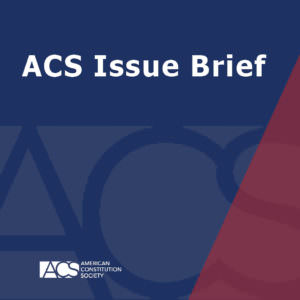Free Riding on Families: Why the American Workplace Needs to Change and How to Do It
Phoebe Taubman Senior Staff Attorney, A Better Balance
December 15, 2009
 ACS is pleased to distribute “Free Riding on Families: Why the American Workplace Needs to Change and How to Do It,” an Issue Brief by Phoebe Taubman, an Equal Justice Works Fellow with A Better Balance: The Work and Family Legal Center, based in New York City. Today’s fast-paced economy relies on many different resources, including electricity, fuel, technology, and the labor of our workers, among many others. Ms. Taubman argues, though, that there is one critical resource whose value we do not fully recognize, and without which our economy would founder: the unpaid work of caring for our families. Whether it is the education and care of the next generation or the comfort and care of the elderly, this work produces extensive benefits for society and we could not go on without it. Ms. Taubman, employing a variety of statistics, discusses the staggering costs imposed on unpaid caregivers, most of whom are women, and on their families, companies, and society as a whole. She contends that, “[f]or a country whose politicians tout family values, the United States has done little to confront these costs and support the critical work that families provide.”
ACS is pleased to distribute “Free Riding on Families: Why the American Workplace Needs to Change and How to Do It,” an Issue Brief by Phoebe Taubman, an Equal Justice Works Fellow with A Better Balance: The Work and Family Legal Center, based in New York City. Today’s fast-paced economy relies on many different resources, including electricity, fuel, technology, and the labor of our workers, among many others. Ms. Taubman argues, though, that there is one critical resource whose value we do not fully recognize, and without which our economy would founder: the unpaid work of caring for our families. Whether it is the education and care of the next generation or the comfort and care of the elderly, this work produces extensive benefits for society and we could not go on without it. Ms. Taubman, employing a variety of statistics, discusses the staggering costs imposed on unpaid caregivers, most of whom are women, and on their families, companies, and society as a whole. She contends that, “[f]or a country whose politicians tout family values, the United States has done little to confront these costs and support the critical work that families provide.”
In her issue brief, Ms. Taubman compares current U.S. policies with those of other countries around the world, and she argues that the comparison is not flattering with regard to our policies on paid maternity leave, paid paternity leave, paid sick leave, and the treatment of part-time workers. She provides empirical data to demonstrate how our workforce has changed since our current policies were implemented, and contends that “[o]ur workplace norms and laws were developed over 50 years ago when a different workforce model and a different family model prevailed [and] . . . [i]t is time to adapt our laws to reflect and support the way Americans live and work today.” She then discusses several potential changes to our law or policies, some of which “are already being considered and/or implemented in a variety of U.S. cities and states, as well as overseas, and all of [which] . . . would provide meaningful, immediate support to families who are struggling to provide and care for their loved ones, and would set us on a path toward a more family-friendly workplace culture for the future.”
